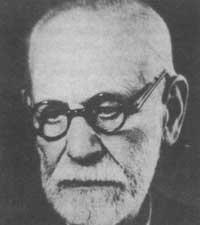Psychiatrist Sigmund Freud
1989/09/01 Azkune Mendia, Iñaki - Elhuyar Fundazioa Iturria: Elhuyar aldizkaria
This prestigious psychiatrist was born on May 6, 1856 in Freiberg (now Pribor, Czechoslovakia), Moravia. He had Jewish parents and after four years in his hometown everyone moved to Vienna.
In the Austrian capital he began to study medicine to escape his tendency to philosophy. He entered the University of Vienna in 1873 and completed his medical studies in 1881. His family was poor and had the opportunity to study at university with the help of a Jewish association.

As a student he took care of neurology, studying the relationships between the different nervous zones. He was one of the first to use cocaine for local anesthesia, but left the road. Anyway, it is said that he used cocaine in small pains and that he helped drug addiction because he also praised it (At that time Sherlock Holmes appeared as cocaine in the first novels, for example).
In 1885 he moved to Paris, where he worked with Doctor Jean Martin Charcot. Charcot began a Psychiatry concerned with hysterism and studying mental disorders as a new field within medicine.
From freud physiology, cellular and nervous, he went to study the psychological aspects of mental disorders and since 1886 worked as a neurologist.
Following the path shown by Mesmer and Braid, a colleague of his used hypnotism to analyze a hysterical patient. In a state of hypnosis, the patient spoke of his old painful memories that he did not remember in normal conditions. Freud applied this hypnosis system in his treatments in 1889. It was then that he began to express his ideas about conscious and unconscious situations. I thought that painful or shameful memories could be repressed or unconscious. Then, those saved desires and memories seemed to influence the person's behavior, and considering only the conscious, there would be no obvious reason for those behaviors.
In 1890 Freud abandoned hypnotism to reach the unconscious. It allowed the patient to speak freely on any subject, leading only a small conversation. Thus, the patient, unlike hypnosis, knew what he had said because he had always been conscious. Once published the topics of the unconscious, theoretically the situation and behaviors of the patient would be right. This paused study of the mind was called psychoanalysis.
For Freud, dreams were very significant because it seemed to him that ideas of the unconscious (sometimes symbolically) emerged. In 1900 he published the book entitled The interpretation of dreams, giving account of his ideas.
The problem that most discussions raised was the interpretation that gave sex. In 1905 he published his theories on childhood sexuality. Childhood sexuality could then have an influence on sexuality, generating routine responses in the adult. It was then that he had to endure numerous mockery and insults, but gradually his ideas gained strength.
In 1902 a group of young people met to work with him and some of them, like Adler and Jung, created new schools.
In the last decade of his life he had to face the Nazi attack for being a Jew. In Austria it was quite protected, but when Hitler's troops conquered Austria it managed to reach London.
He lived a year in London, until cancer took him from this world on 23 September 1939. Therefore, the anniversary of the quarantine is now celebrated.

Gai honi buruzko eduki gehiago
Elhuyarrek garatutako teknologia




